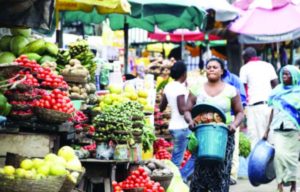
Accra, Ghana, September 1, 2019//-Sub-Saharan Africa is home to the second largest informal economy in the world after Latin America and the Caribbean, according to the International Monetary Fund (IMF).
The IMF’s data shows that this vibrant informal economy accounts for around 38% of the region’s GDP. Yet the informal traders that drive this market are underserved by traditional financial services companies and largely excluded from the formal financial system.
Innovative financial technology solutions can, however, provide a bridge between the informal economy and formal financial services, rewriting the rules of informal trade in Africa.
Connecting informal merchants to digitised financial services offers the opportunity to
address merchant pain points, improve efficiencies across the value chain, and ultimately
boost economic growth.
Facing a fragmented informal economy in Africa
Cash is still king in sub Saharan Africa, especially in the informal sector, despite the rapid growth in mobile money and mobile payments over the past 10 years.
The payments infrastructure supporting retail is still mostly analogue and the vast majority of transactions
are executed in cash and recorded on paper.
Mastercard estimates that around 95% of transactions in Africa and the Middle East are still conducted using cash.
Despite the well-understood drawbacks of cash – the high handling costs, the way it hampers investment and borrowing, and the risk of loss or theft – the migration from cash in Africa is likely to take decades.
In the interim, informal merchants’ reliance on cash as a medium of exchange and the resulting lack of digital data means that financial services companies cannot accurately calculate credit scores and confidently lend them money.
The result is that informal merchants lack the working capital they need to invest in goods and services that will grow their businesses.
If they need access to a short-term loan – for instance, to purchase stock of physical goods or virtual products like airtime – they will need to turn to a microlender that may charge them exorbitant interest rates.
The choice they face is between turning customers away because they do not have stock or paying high interest rates when their profit margins on the products they sell are paper-thin.
The lack of a uniform payments infrastructure and reliable digital data also means that banks, distributors and other members of the ecosystem do not have a consistent view of the informal market or a complete view of the merchant’s needs.
Fragmentation of markets – between digital and analogue, financially included and excluded, urban and rural – complicate their efforts to reach scale and reduce friction in the supply chain.
Merchant-first tools for scale
Since the challenges that informal merchants face – reliance on cash, a lack of working capital and high transaction costs – are closely linked, they need to be solved in an integrated fashion.
Any solution to address the challenges outlined above should thus start with a merchant-first perspective and combine the digital tools, real-time data analytics and working capital that informal traders need to fuel their growth into a single offering.
The complexity and fragmentation of the ecosystem means that partnerships between financial technology companies and incumbents such as banks, mobile and traditional payments companies are key to building such propositions.
The Nomanini fintech platform – a managed cloud solution – connects service providers such as banks and FMCG distributors to the merchants in the informal economy, bringing unity to the landscape.
Merchant-first tools for scale
Since the challenges that informal merchants face – reliance on cash, a lack of working capital and high transaction costs – are closely linked, they need to be solved in an integrated fashion.
Any solution to address the challenges outlined above should thus start with a merchant-first perspective and combine the digital tools, real-time data analytics and working capital that informal traders need to fuel their growth into a single offering.
The complexity and fragmentation of the ecosystem means that partnerships between financial technology companies and incumbents such as banks, mobile and traditional payments companies are key to building such propositions.
The Nomanini fintech platform – a managed cloud solution – connects service providers such as banks and FMCG distributors to the merchants in the informal economy, bringing unity to the landscape.
Nomanini turns merchants mobile devices into a retail point-of-sale (POS) device connected to an interoperable merchant wallet, enabling them to facilitate a range of electronic payments from multiple service
providers without investing in further infrastructure.
This will help to reduce the usage of cash in the informal market by facilitating payments
from a range of wallet providers.
Merchants can offer customers a wide range of digital banking, mobile, utility and entertainment services via their interoperable wallet, expanding their selection of services.
Merchants also use the universal wallet to consolidate and manage funds for services, enabling them to pay for inventory electronically rather than with cash.
The data they generate from their mobile POS will help nurture trust between merchants and distributors, as well as unlock credit flows from banks due to reduced risk and more predictable returns.
This will provide traders with access to the working capital they need to grow their businesses. They will also have access to analytics that they can use to make better decisions about which stock to buy and when.
Culled from case study titled: ‘Fintech & The Informal Retail Economy in Africa, 2019’


